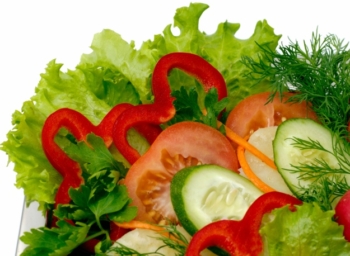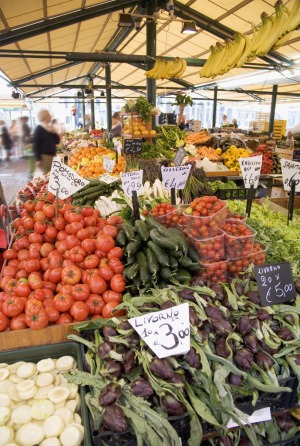This is the 2017 list of 12 fruits and vegetables that are the ‘Dirty Dozen’. They are best eaten organic as they have been proven to be drenched in deadly chemicals.
There are other fruit and vegetable produce that don’t get as much spraying and you can get away with non-organic if you have to. Make sure you know the difference!
12 Fruits and Vegetables Best To Eat Organic (The Dirty Dozen)
This list of foods is called the “Dirty Dozen” and is updated each year at EWG’s Shopper’s Guide. The below list was last updated for 2017. All foods listed below from worst to best (lower numbers = more pesticides)
- Strawberries: They are delicate and prone to disease, including fungal attacks that can turn them to mush during transit and storage. Millions of pounds of methyl bromide are used every year by California strawberry growers. It damages the ozone layer, so it is banned in many parts of the world. “This chemical has an uncanny ability to damage DNA, which creates a host of problems, ranging from reproductive effects to cancer and neurological damage,” explains Gina Solomon, MD, MPH, chief scientist at Natural Resources Defense Council. “Since the chemical is also highly volatile, it is easy for it to drift and affect workers and nearby communities.
- Spinach: Those green leaves are loved by grasshoppers and other insects, and the plants themselves suck up chemicals from the soil. For example, spinach has been shown to contain DDT from the soil, even though DDT was banned over 10 years ago. (You don’t just want to pass on spinach, though.)
- Nectarines: They are closely related to peaches, so they have the same weakness and “need” the same chemical support.
- Apples: This healthy powerfood has to look perfect or consumers are suspicious. Apples are susceptible to more than 30 insects and at least 10 diseases, and so are sprayed many times during the growing season. Fungicides and other chemicals are also added after picking to prevent tiny blemishes that can accumulate during storage of up to 9 months.
- Peaches: Farmers may spray peaches every week or two from bloom to harvest—and peach fuzz can trap pesticides says peach breeder John R. Clark, PhD, a horticulturist at the University of Arkansas, who peels every one of the thousands of peaches he eats each year. The USDA Pesticide Data Program found 62 pesticide residues.
- Pears: pear trees attract a number of insects that harm the foliage thus productivity is reduced and can damage fruit.
- Cherries: Pesticides were found on 91% of the cherries tested in the EWG study.
- Grapes: To prevent easily-occurring rot, farmers spray aggressively with fungicides. The USDA Pesticide Data Program found 34 pesticide residues.
- Celery: “Nobody likes to find a caterpillar-damaged stalk in their celery bunch,” says Stuart Reitz, PhD, a research entomologist with the USDA. There are 64 pesticide residues found on celery.
- Tomatoes: Have very thin skin so pesticides sink in easily.

- Sweet Bell Peppers: The creases in their crowns hold pesticides, so they soak in. They also have less insect-deterring compounds in them.
- Potatoes: They are sprayed 5 or more times throughout the growing season to protect against various pests. After harvesting, another round of spraying occurs in the packing shed to ward off mold.
Plus these 6 making ‘The Dirty 18’
13. Cucumbers
14. Cherry Tomatoes
15. Lettuce
16. Snap peas – imported
17. Blueberries – domestic
18. Hot peppers +
It is best to not eat any of the dirty dozen unless they have that ‘certified organic’ sticker!
Eating only organic can be expensive for most of us. What I do is concentrate on eating the ‘Dirty Dozen’ organic and the ones not on this list I don’t always eat organic unless they are at a reasonable price. If organic strawberries are very expensive, I just don’t eat them.
Clean Fifteen – Produce with the least amount of chemicals
- Sweet Corn*
- Avocados
- Pineapples
- Cabbage
- Onions
- Sweet peas, frozen
- Papayas*
- Asparagus
- Mangoes
- Eggplant
- Honeydew Melon
- Kiwi
- Cantaloupe
- Cauliflower
- Grapefruit
* Sweet corn, papaya and summer squash is often produced from genetically modified seeds so buy organic if you want to avoid genetically modified produce.
Note: The clean produce usually has thick rinds that you usually don’t eat. There are a few exceptions.
for example, asparagus and mushrooms spring up so fast the insects don’t have time to attack. Sweet potato has its own unique bug protection.
The dirty dozen list can be generalized by foods that have lots of surface area such as leaves or skin which we eat.

Is Organic Always Safe?
Some people are still a little cautious of the organic produce food found in large regular stores, which you can’t always verify.
I prefer to buy my food at the farmers’ market, where I know exactly where it is coming from. You get to know the farmers and their integrity. Also, I do tend to buy according to the Dirty Dozen and the 15 least contaminated produce types. (You can read more about farmers’ markets and find one close to you here: The Joy of Farmer’s Markets)
My Personal Strategy
The ‘Dirty Dozen’ is a list I take seriously, and I will not buy produce unless they are organic. I have a history of poor health. If there is an occasion where I buy non-organic, I soak them in my favorite fruit and vegetable rinse that takes away some of the chemicals. Nothing can remove all the chemicals, so if organic strawberries are not in my budget, then I don’t eat strawberries.
If you are not concerned about putting chemicals into your body, then do it for the earth and for the poor workers that are getting sick from working with these toxic chemicals. For instance, methyl iodide (used in strawberries) is a serious health risk to the people who work in the strawberry fields and to the families who live nearby. They are getting sick from it. Fortunately, in the summer, I grow my own strawberries and know a good farmer that grows organic ones too.


Hi, I just found your site and am interested in getting stevia for sweetening, but without endangering my health. I just signed up for your site, but didn’t know where to inquire about the Stevia you mentioned is the safest. Thank you!
I too would like to know more about stevia. My diabetic friend has told me that the xylitol I used to replace sugar for baking tends to give him ‘the runs ‘ ! Any informed comments?
Hi, I just found your site and am interested in getting stevia for sweetening, but without endangering my health.
What is the best type of lettuce to use in salads? And should I buy organic lettuce?